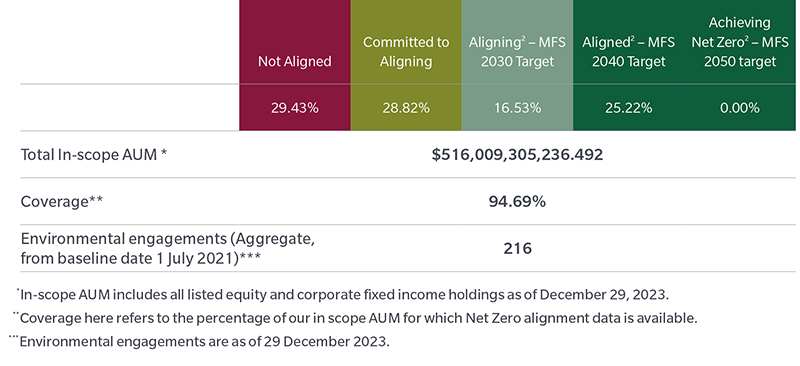
Our Progress Towards Our Net Zero Commitments
An executive summary of our Net Zero Progress Report.
Key Points
1. Our second Net Zero Progress Report highlights the progress we've made towards our net zero commitments. In July 2021, we joined the Net Zero Asset Managers initiative, endorsing the aim of achieving net zero emissions by 2050 or sooner. Our strategy for net zero alignment is rooted in active ownership with our investment investee, assessing and managing the financial risks related to climate change.
2. Our net zero commitments cover all our public equity and corporate fixed income holdings, which make up 92% of our total assets under management as at the time of writing this report. Our targets include the following interim targets:
- 90% of in-scope AUM considered net zero aligned or aligning by 20301
- 100% of in-scope AUM considered net zero aligned or achieving by 2040
- 100% of AUM considered achieving net zero by 2050
3. The Net Zero Progress Tracker in our report provides a comprehensive overview of our in-scope holdings and their alignment with our net zero goals.

4. Our report includes in-depth case studies of companies such as Diageo, Danone and Reckitt Benckiser, which are making significant progress toward decarbonization. These companies are evaluated based on management credibility, financial credibility, technological credibility, competitive credibility and stakeholder alignment. Additionally, we do a deep dive on the consumer staples sector, which presents a complex decarbonization challenge due to its geographically diverse and decentralized supply chains. We use a differentiated materiality framework to assess the financial implications of climate risk and opportunity for this sector.
5. We participate in various industry initiatives to deepen our understanding and management of complex and evolving risks. These collaborations complement our individual engagement efforts, providing scale and momentum.
Endnotes
1 Our in-scope assets covered by our net zero engagement commitments include all public equities and corporate fixed income assets, approximately 92% of our current AUM.
2 The data presented above are aligned with the Net Zero Investment Framework (NZIF) and have been sourced from a third-party data provider.
MFS may incorporate environmental, social, or governance (ESG) factors into its investment decision making, fundamental investment analysis and engagement activities when communicating with issuers. The statements or examples provided above illustrate certain ways that MFS has historically incorporated ESG factors when analyzing or engaging with certain issuers but they are not intended to imply that favorable investment, ESG outcomes or engagement outcomes are guaranteed in all situations or in any individual situation. Engagements typically consist of a series of communications that are ongoing and often protracted, and may not necessarily result in changes to any issuer’s ESG-related practices. Issuer outcomes are based on many factors and favorable investment or engagement outcomes, including those described above, may be unrelated to MFS analysis or activities. The degree to which MFS incorporates ESG factors into its investment decision making, investment analysis and/or engagement activities will vary by strategy, product, and asset class, and may also vary over time, and will generally be determined based on MFS’ opinion of the relevance and materiality of the specific ESG factors (which may differ from judgements or opinions of third-parties, including investors). Any examples above may not be representative of ESG factors used in the management of any investor’s portfolio. Any ESG assessments or incorporation of ESG factors by MFS may be reliant on data received from third-parties (including investee companies and ESG data vendors), which may be inaccurate, incomplete, inconsistent, out-of-date or estimated, or only consider certain ESG aspects (rather than looking at the entire sustainability profile and actions of an investment or its value chain), and as such, may adversely impact MFS’ analysis of the ESG factors relevant to an investment. The information included above, as well as individual companies and/or securities mentioned, should not be construed as investment advice, a recommendation to buy or sell or an indication of trading intent on behalf of any MFS product.
Please keep in mind that a sustainable investing approach does not guarantee positive results and all investments, including those that integrate ESG considerations into the investment process, carry a certain amount of risk including the possible loss of the principal amount invested.
The views expressed are subject to change at any time. These views are for informational purposes only and should not be relied upon as a recommendation to purchase any security or as a solicitation or investment advice. No forecast can be guaranteed.
This material is directed at investment professionals for general information use only with no consideration given to the specific investment objective, financial situation and particular needs of any specific person. Any securities and/or sectors mentioned herein are for illustration purposes and should not be construed as a recommendation for investment. Investment involves risk. Past performance is not indicative of future performance. The information contained herein may not be copied, reproduced or redistributed without the express consent of MFS Investment Management (“MFS”). While the information is believed to be accurate, it may be subject to change without notice. MFS does not warrant or represent that it is free from errors or omissions or that the information is suitable for any particular person’s intended use. Except in so far as any liability under any law cannot be excluded, MFS does not accept liability for any inaccuracy or for the investment decisions or any other actions taken by any person on the basis of the material included. MFS does not authorise distribution to retail investors.